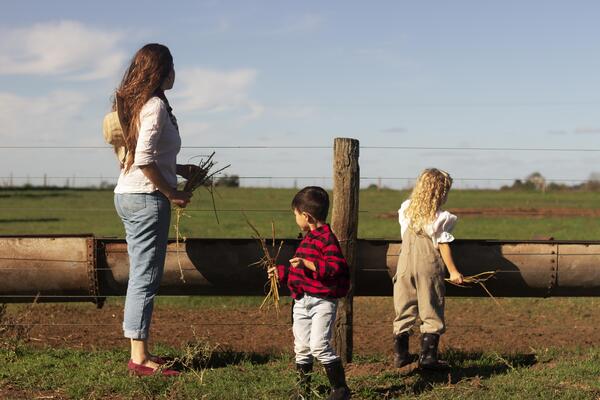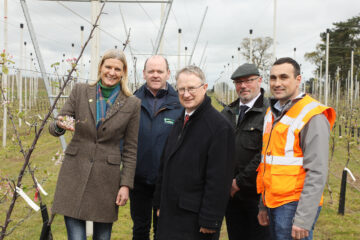The farm can be an exciting and enriching environment for children, providing them with a unique opportunity to learn about nature, animals, and agriculture. However, it can also be a dangerous environment if they are left unsupervised. Almost every year, children are tragically killed on Irish farms. There is a common misconception that kids who grow up on farms know all the risks associated. However, statistically, the majority of fatalities on farms are of people and kids who live on the farm. To keep children safe, it’s important to never allow children onto a farmyard unless they are closely supervised by an adult.
Furthermore, any visitors or contractors on the farm should also be made aware that there are children present or nearby.
Teagasc has put together the following list of reasons for child accidents on farms:
No safe play area:
A safe and secure play area for children should be provided away from all work activities, in full view of the dwelling house.
Lack of supervision:
Children require supervision at all times. Always get two or three days’ notice when children are bringing home friends from school, so that sufficient supervision may be provided.
Children driving or operating farm machinery:
Children under 16 years of age should not operate self-propelled machinery, or power-driven machinery with cutting, splitting, or crushing mechanisms. Keys should be removed from vehicles at all times and controls should be left in neutral. Lower any loaders to the ground and apply the hand brake.
Risks posed by animals:
Animals don’t need to be dangerous to pose a danger to children, as their sheer size can cause serious injury from crushing. Veterinary medicines not securely stored may also cause serious sickness or death. Children should be trained to always wash their hands after being with animals or pets.
Stacks of bales:
Children should be discouraged from using bales of any description for playing. It is very easy to fall from stacked bales, resulting in serious injury or falling between them leading to suffocation. Make sure there is no evidence of children burrowing under stacked bales. Keep matches in a safe place.
Chemicals:
Children under 16 should never handle chemicals. Always keep them in their correct containers and securely stored.
Drowning risks – water and slurry:
Slurry pits and lagoons should be safely secured. Children should never be in the vicinity during slurry agitation or spreading. Sheep dips and water tanks should be kept covered when not in use.
Ladders:
Store ladders flat on the ground or on wall brackets to prevent children from climbing.
Carrying passengers on farm machinery:
Be very aware that children can interfere with controls if left alone in a tractor cab. Many children have been killed falling from the door or rear window of tractors.
Remember, farms are not playgrounds. Children will often get into apparently inaccessible places. Make sure you exclude them from potentially dangerous areas. They should not be allowed in farmyards on busy days.
By implementing the measures below, we can create a secure and nurturing environment where children can thrive while experiencing the wonders of farm life.
Create a Safe Place on the Farm for Children
If you live on a farm, you must
- Keep children out of work areas.
- Have a fenced-off safe play area in view of the home.
- Have fencing with mesh right down to the ground so that children cannot slip through gates and fences or climb over them.
- Have easy-to-read danger signs and tell children what they mean.
You should also do a risk assessment to find any risks to child safety around the farm.
Teach Your Child How to be Safe on the Farm
Talk to children about safety on the farm. Tell them about the dangers and set the rules. Do not expect a child to take on the responsibility of keeping themselves safe. Children do not fully understand danger and thusly need adult supervision.
Preventing Falls on the Farm
Children like to climb. Many serious, even fatal, injuries happen after a fall from a height or after a child has been hit by a falling or moving object.
Things you can do to prevent falls:
- Make sure there is no access to high areas
- Don’t let children play on bales, as they can fall off them or between them and suffocate
- Store ladders on the ground or on wall brackets, so they can’t be climbed.
- Keep all buildings, walls and fences in a good and safe condition
- Store items and equipment such as wire fencing and gates until you are ready to assemble them
- Secure gates and doors. Heavy swinging gates or doors are very dangerous, especially in high winds
- Never leave equipment or items against walls, sheds or other structures. Children may climb on it or cause it to fall on them
Preventing Drowning on the Farm
Even a shower of rain can fill a container enough for a child to drown in. To keep children safe from water outside:
- Empty, fence off or safely cover anything that can collect water. This includes wells, ponds, drains, soak pits and water tanks
- Never leave children alone on a farm
- Fence off exposed areas, including slurry pits – slurry is both a drowning and suffocation risk
- Remind children to stay away from edges
Farm Machinery and Children
Children should never be allowed near tractors and farm machinery, whether they are in use or not. An adult should always closely supervise them.
You should always:
- Lock unattended vehicles
- Leave vehicles in neutral and with the handbrake on
- Remove keys and keep them away from children
- Lower all loaders to the ground
- Guard all moving parts of machinery
- Put safety measures in place when finished using machinery
Children under seven years old should not be allowed in the cab of a tractor or other farm machinery, even in the passenger seat.
Children aged between seven and sixteen should not be allowed on tractors or trailers unless you have done a full risk assessment and:
- It has a safety cab or frame fitted with a proper passenger seat with seat belts
- They follow strict rules not to touch controls
- They keep their seat belt on
- Furthermore, they understand not to distract the driver
Set clear ground rules and do not give children the habit of getting spins on tractors and other farm machinery.
Farm Animals and Child Safety
Children will want to touch animals but they need to understand that animals can be dangerous.
Here are some tips to keep kids safe when dealing with animals:
- Keep children at a safe distance from livestock
- Remember that animals guarding their young could be more aggressive and unpredictable than usual
- Fit correct fencing and gates
- Supervise children if they are close to or feeding any animal
- Teach children to always wash their hands after being with animals
- Keep sick animals away from children
- Never walk behind a horse because they can kick and cause severe injury
Chemicals and Poisons Around the Farm
Children under sixteen should never handle chemicals.Keep all pesticides, cleaning fluids, veterinary medicines and equipment:
- Away from children
- In their original labelled containers
- In a securely locked store
Never use soft drink bottles for storage of any chemicals, medicines, pesticides or any other poisonous or harmful substances.
Poisonous Plants
Some plants are also poisonous. Children should not:
- Eat wild mushrooms or berries without first checking with an adult
- Pick ragwort
- Touch hogweed (often found near rivers and lakes) as it can cause nasty skin irritation
- Touch weeds, foxglove or poison ivy as they are all poisonous
Farming and the Law
By law, all farmers must:
- Have a safety statement that follows the Safety, Health and Welfare at Work Act 2005 if there are more than three employees
- Follow the farm safety code of practice if there are three or fewer employees
- Store guns safely and follow the firearms regulations
In essence, the farm can be a dangerous place for children and it’s up to farmers to keep them safe. It must be remembered that children are at higher risk than adults of fatal injuries on a farm, and safety cannot be overlooked in any aspect of agriculture. The number of children killed on farms should be zero each year, and implementing and following the above guidelines will go a long way to decreasing any risk that a farm can impose on a child’s safety.



